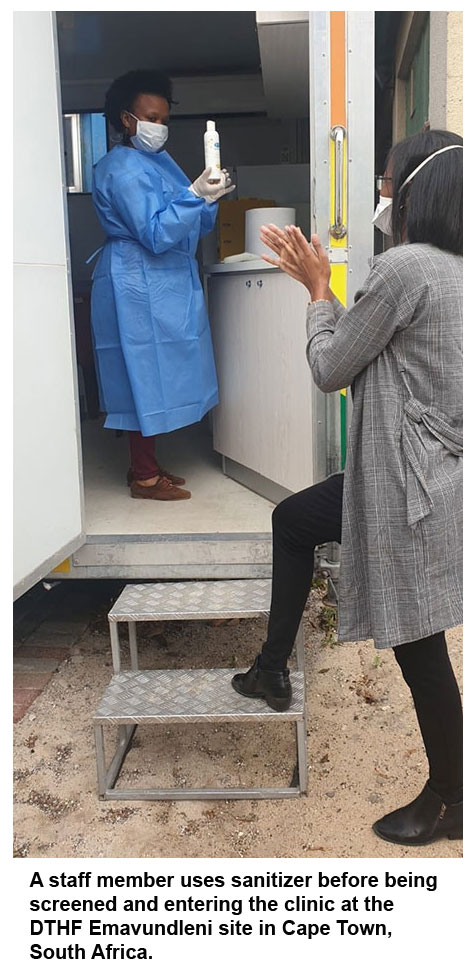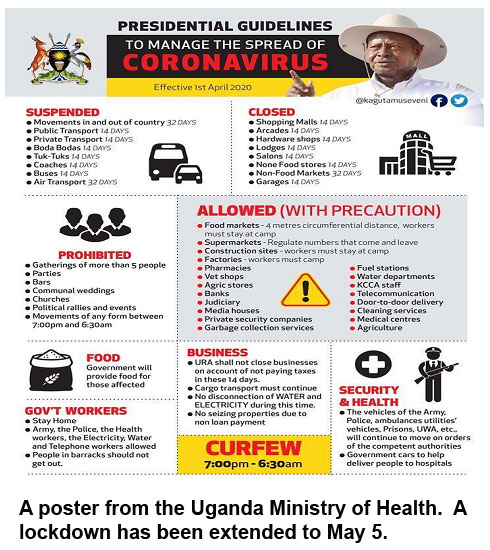Clare Collins and Lisa Rossi, MTN Communications
The COVID-19 global pandemic has dramatically changed the everyday lives of individuals and communities nearly everywhere, challenging our collective perseverance on an unprecedented scale. Across the globe, those in the public health field are working around the clock to provide support to individuals and communities. The pandemic is having a major impact on the way we typically approach our work, requiring adjustment to a “new normal.” The conduct of HIV clinical trials has been no exception.
 For those working on the REACH study, it’s been a herculean task in the best of times – but doing so in the midst of government-enforced lockdowns and reduced site operations has required an entirely different level of tenacity and resolve. REACH sites have been more than up to the challenge.
For those working on the REACH study, it’s been a herculean task in the best of times – but doing so in the midst of government-enforced lockdowns and reduced site operations has required an entirely different level of tenacity and resolve. REACH sites have been more than up to the challenge.
REACH (Reversing the Epidemic in Africa with Choices in HIV Prevention), or MTN-034, is seeking to understand the HIV prevention needs and preferences of adolescent girls and young women ages 16-21 by evaluating how they use the monthly dapivirine vaginal ring and Truvada as daily PrEP and their preferences for each, as well as evaluating the safety of these methods.
As with other MTN studies, enrollment has been paused and follow-up of participants is continuing to the extent it is both safe and feasible.
For REACH, which is more than 80 percent enrolled, this means following 247 participants (85 of whom are under the age of 18) within the context of highly restrictive guidelines in each of the trial-site countries. REACH is being conducted at four sites in South Africa, Uganda and Zimbabwe.
Across the board, site teams have shown how devoted they are to ensuring the success of the study, with the safety of participants – and staff – their top priority. They have been innovative and creative, doing pretty much whatever it takes. The young women in REACH have shown similar resiliency and commitment to the study. Their collective will is nothing short of inspiring.
When the staff at Wits Reproductive Health and HIV Institute (Wits RHI) in Johannesburg first became aware of the likelihood of their government’s impeding lockdown, they were able to bring nearly every study participant into the clinic to talk to them about the circumstances surrounding the pandemic, and to reassure them REACH was continuing. The South African government initially called for a three-week lockdown, but the staff didn’t take any chances and opted to provide participants with a two-months’ supply of study product. (Indeed, the lockdown was extended for an additional two weeks.) The Wits RHI team also developed an innovative tool to support participants in tracking when they need to change the dapivirine ring or start a new bottle of tablets, counseling each participant on safe product storage during the lockdown.
In Cape Town, the Emavundleni site at the Desmond Tutu HIV Foundation (DTHF) has managed to keep the clinic open one day a week. To address the government limitations on vehicular travel, staff have been picking up participants from where they live, abiding by social distancing recommendations – allowing only three passengers at a time in a vehicle that typically seats 16 – and providing them with face masks and hand sanitizer. At the clinic, both staff and participants are screened for signs and symptoms of COVID-19 before being allowed to enter – measures that all sites have taken as well. In between visits, the Emavundleni site are using WhatsApp to check in with their participants.
 Like South Africa, the Ugandan government has implemented strict restrictions on public and private transport. The study site, the Makerere University-Johns Hopkins University (MU-JHU) Research Collaborative in Kampala, proactively obtained a waiver so that its drivers could take both participants and staff to and from the clinic, making sure everyone is home by the 7 p.m. curfew. Drivers are instructed to meet and pick-up participants at neutral locations away from their homes (gas stations, or any other preferred meeting locations) to protect the confidentiality of participants who have chosen not to disclose they are part of the study. As with other sites, the MU-JHU team has made it their goal to provide participants with enough study product to get them through what they anticipate will be an extended lockdown period.
Like South Africa, the Ugandan government has implemented strict restrictions on public and private transport. The study site, the Makerere University-Johns Hopkins University (MU-JHU) Research Collaborative in Kampala, proactively obtained a waiver so that its drivers could take both participants and staff to and from the clinic, making sure everyone is home by the 7 p.m. curfew. Drivers are instructed to meet and pick-up participants at neutral locations away from their homes (gas stations, or any other preferred meeting locations) to protect the confidentiality of participants who have chosen not to disclose they are part of the study. As with other sites, the MU-JHU team has made it their goal to provide participants with enough study product to get them through what they anticipate will be an extended lockdown period.
In late March when the staff from the Spilhaus site at the University of Zimbabwe College of Health Sciences Clinical Trials Research Centre (UZCHS-CTRC) got wind that a government-imposed lockdown was scheduled to begin in the coming days, they hurriedly contacted participants, most of whom were able to come into the clinic over the weekend to receive study product. With the nationwide lockdown now being extended, the site is making plans to provide study products to participants in the longer term.
While some sites are open with limited staffing to provide essential services, many staff are mostly working from home, where Internet connectivity isn’t always reliable and power outages can be common. These are challenging times, but sites continue to demonstrate selfless dedication and strong determination, responding rapidly and thoughtfully with each new development.
We are extremely grateful to the REACH study site staff for going above and beyond! It’s the kind of spirit we need to get us through this unfortunate chapter in history. Thanks to them – and to the entire protocol team – we will achieve what REACH set out to do – to empower adolescent girls and young women with choices in HIV prevention!
Click here for PDF version of this document.
21 April 2020
